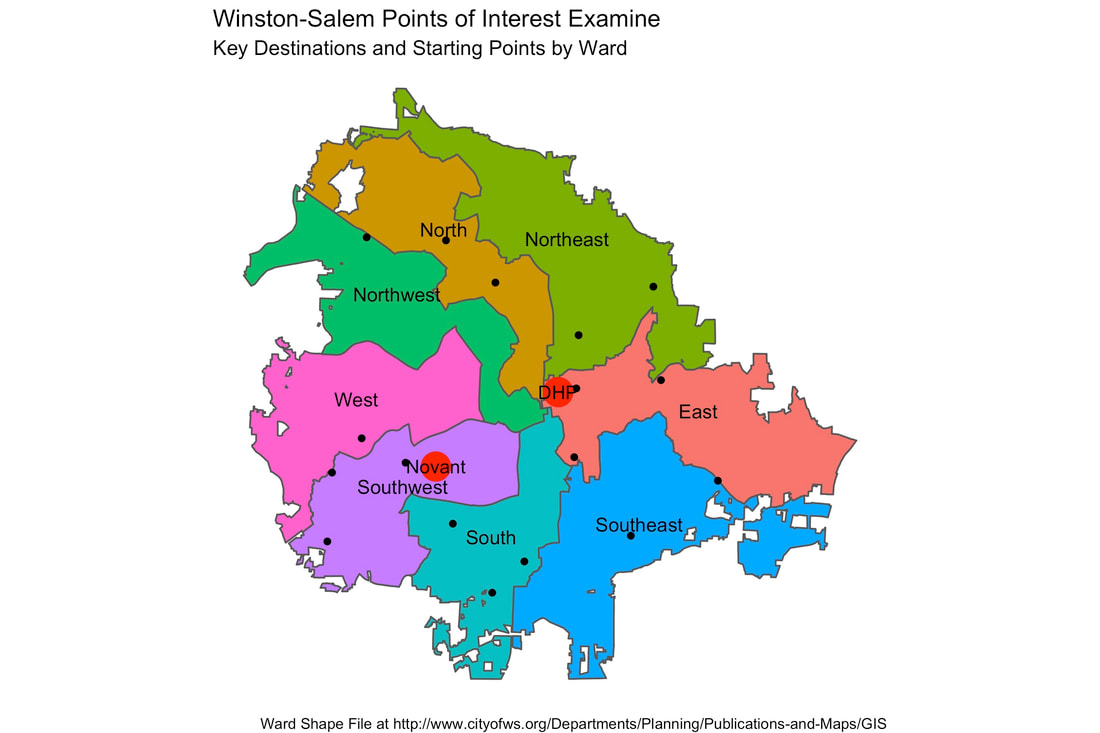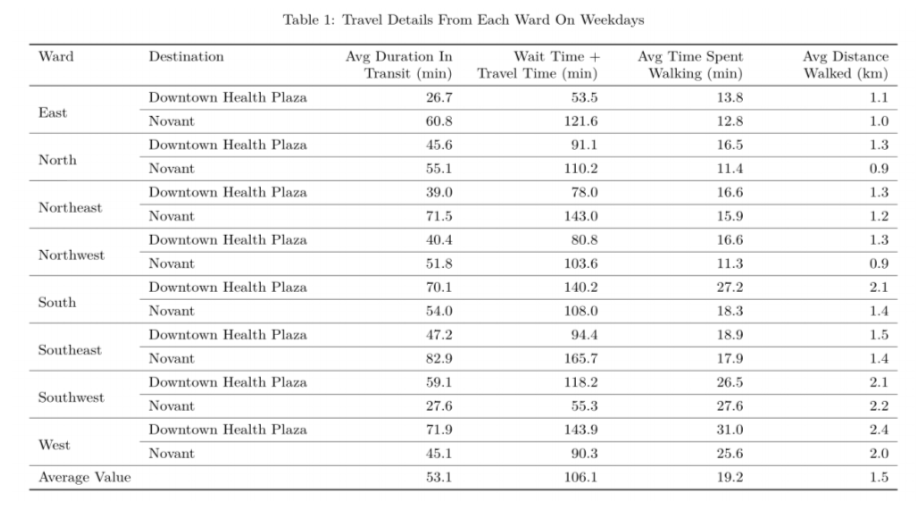BackgroundFor Winston-Salem residents without the means or ability to drive, the bus system plays a critical role in determining their ability to reach jobs, education, medical care, child care, public benefits, and community activities. The Business 40 infrastructure improvement project presents an opportunity to consider the mobility of all Winston-Salem residents and to focus on how the bus system can be used to advance health equity in our community. The NC DOT has designated funds to expand bus service during the Business 40 closure.
The analysis in Table 1 reflects the current total amount of time it takes citizens from each ward (Map) to reach key healthcare access locations, prior to any increase in transit services.
These data are a baseline from which to measure how improvements in bus service impact the amount of time residents spend traveling to health services. MethodOur analysis utilizes the Google Transit API (Application Programming Interface) to calculate optimum transit duration from multiple locations in each ward to the major health assets in the community.[1] (Note: Novant Medical Center and Wake Forest Baptist Medical Center are along the same bus routes and are separated by +/- 5 minutes on the bus.) The API allows for calculation of additional details about the trip, including:
ConclusionsEconomic mobility in Winston-Salem is a pressing concern. For those without the means or ability to access private transportation, it takes a disproportionately greater amount of time to reach important health care assets. The Business 40 closure affords an opportunity to consider how the bus system influences residents’ ability to access to health services, and how improvements to bus services may enhance health care access and utilization. This brief analysis is limited to data regarding health care access, though Google API can be broadly used to document transportation equity within our community. Further critical thought about the impact of NC DOT Business 40 closure mitigation funds should be ongoing. We anticipate the expanded bus services will support a more equitable and just public transportation system. Recommendations
Notes[1] WSTA has provided Google bus schedule and route information for display on Google Maps. The Google Transit API makes this data available for querying based on specific start times, start locations, and destinations. The addresses utilized for this analysis are available here. AuthorsMichael DeWitt is a data scientist working for Wake Forest University in Winston-Salem, NC. He recently moved to higher education after working in the manufacturing sector for the last ten years. His interests are in statistical programming and analysis, Bayesian modeling, survey analysis, and improving social mobility. Phillip Summers works for the Wake Forest Baptist Medical Center in Winston-Salem, North Carolina. He was a Research Associate with the Department of Family and Community Medicine before joining the Program in Community Engagement as an Associate Director. He has used his background in Public Health leadership in a variety of non-profit organizations both locally and globally. His research and practice focus on health and justice for immigrants and reducing health disparities. Jeff Bloomfield, Keena Moore, and Megan Irby also contributed to this research and article. The views expressed above are solely the author's and are not endorsed by the Virginia Policy Review, The Frank Batten School of Leadership and Public Policy, or the University of Virginia. Although this organization has members who are University of Virginia students and may have University employees associated or engaged in its activities and affairs, the organization is not a part of or an agency of the University. It is a separate and independent organization which is responsible for and manages its own activities and affairs. The University does not direct, supervise or control the organization and is not responsible for the organization’s contracts, acts, or omissions.
0 Comments
Your comment will be posted after it is approved.
Leave a Reply. |
Categories
All
Archives
April 2022
|
ADDRESSVirginia Policy Review
235 McCormick Rd. Charlottesville, VA 22904 |
|
SOCIAL MEDIA |

